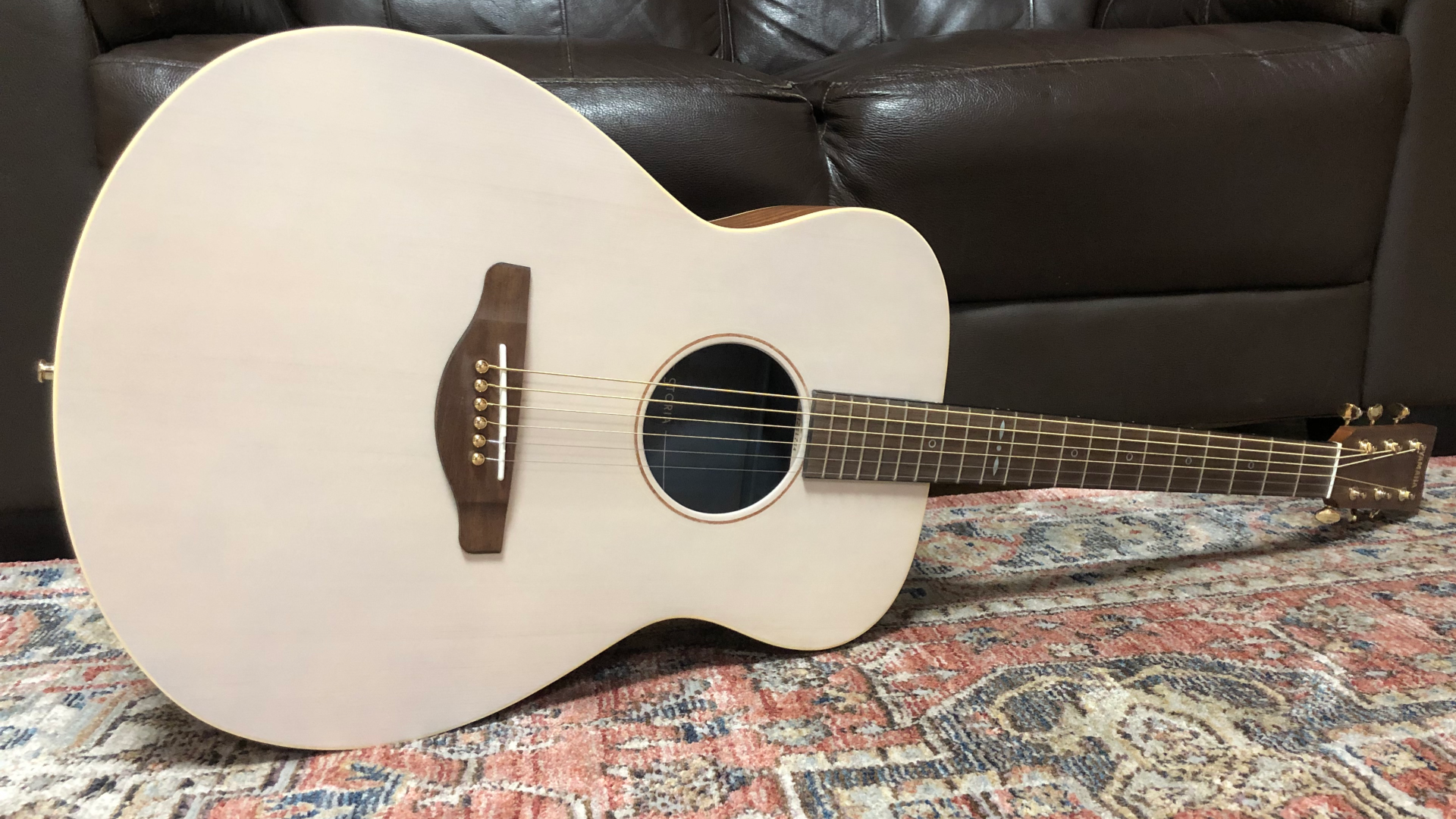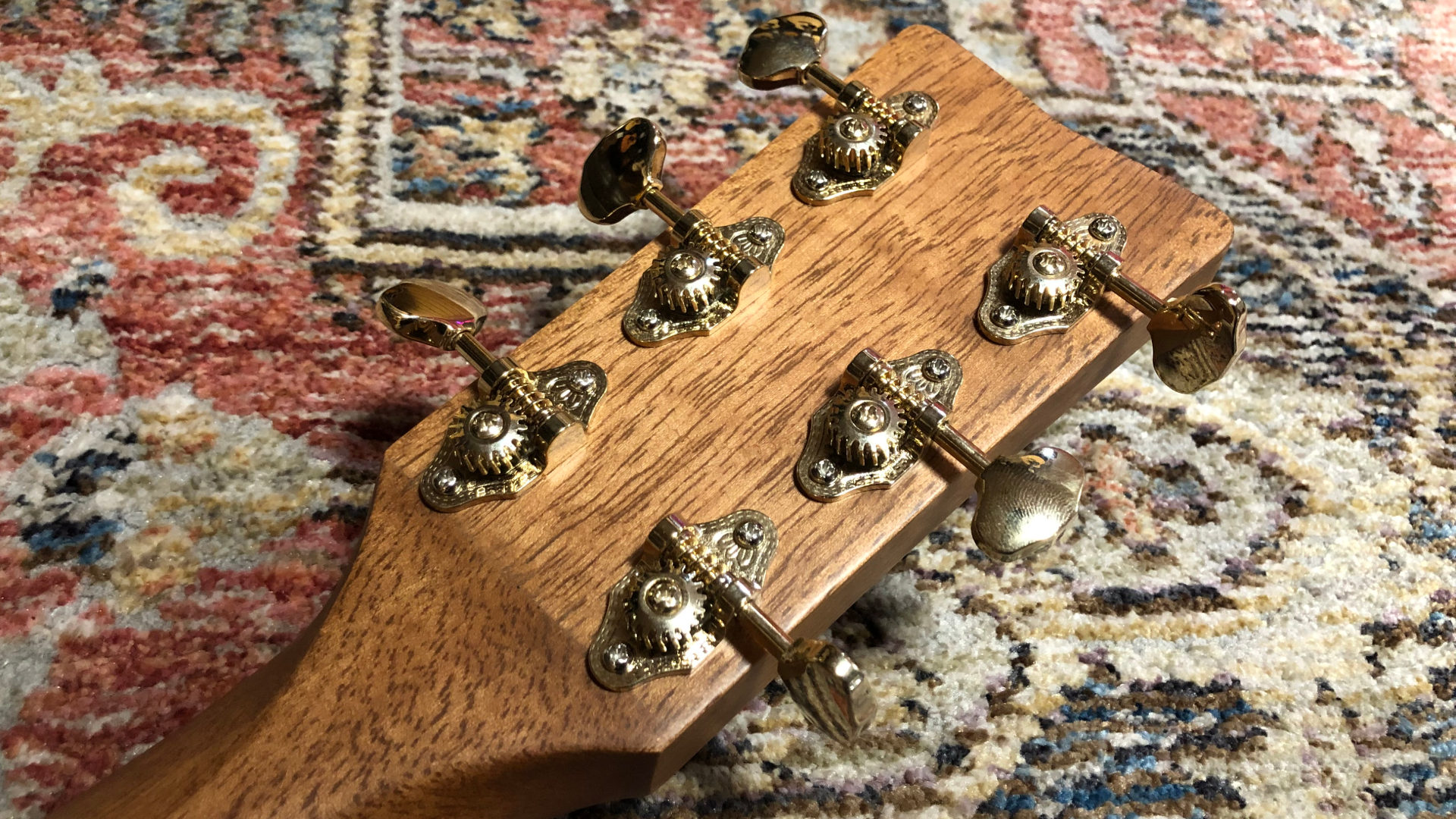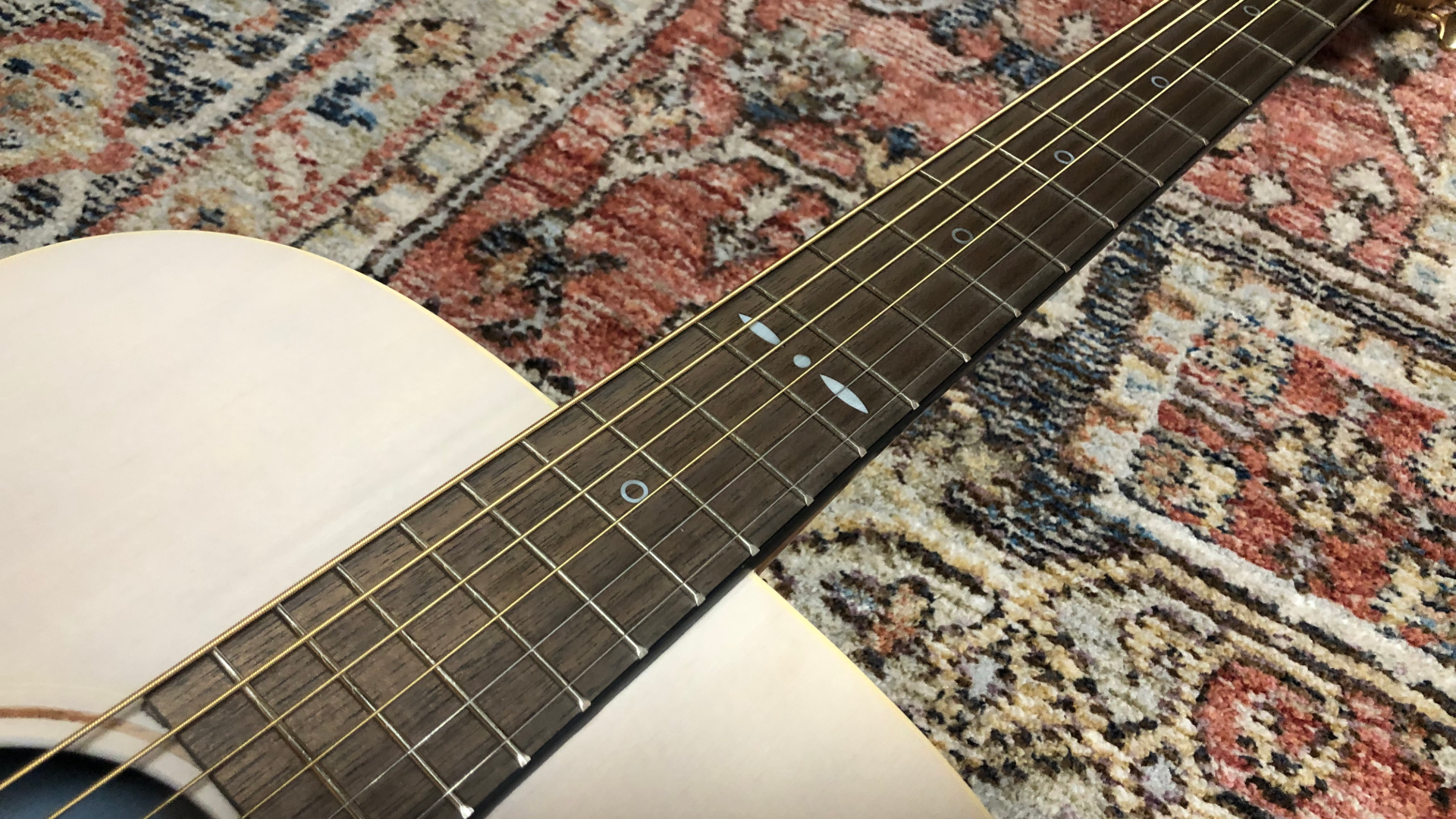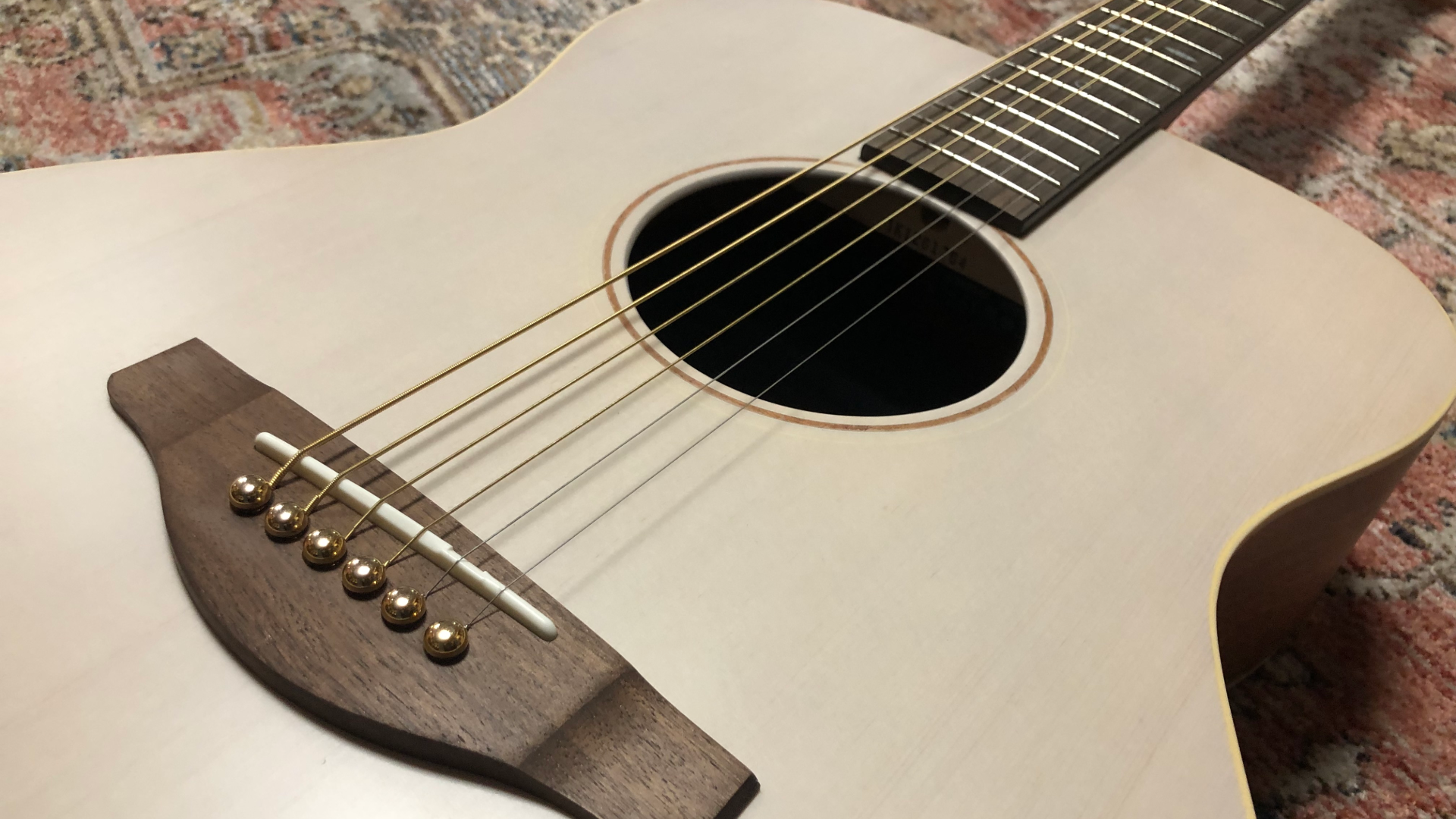
Yamaha Storia I review: What is it?
Acoustic guitars have followed the same rinse-and-repeat aesthetic since their inception. We’re talking ivory bridge pins, natural wood tops, nickel tuning pegs – you get the idea. But what about the sophisticated, trendy type? What choice do they have? After all, god forbid your guitar doesn’t match your modern minimalist living room. Well, Yamaha has the answer: the Storia I.
Jokes aside, it’s refreshing to see Yamaha approach acoustic guitar design differently. The Storia I was purposefully developed to elevate your living space decor. If you’re after an instrument that doesn’t look like an eyesore when lying dormant, then the Storia series is a very viable option. Especially if you have a fed-up roommate getting on your back.
That said, Yamaha hasn't just focused on aesthetics with the Storia I. They've also packed it with player-friendly features, ensuring it's not just a pretty face. Whether you're concerned with playability, tone, or comfort, the Storia I has you covered.
As well as fashionistas, Yamaha has aimed the Storia I at newbie and intermediate players looking for a good looking beginner acoustic guitar at a more attractive price point. Advanced players, who are expected to pay 'advanced' prices, have a plethora of options for nice-looking guitars. Yamaha wanted to spread the good looks all around, no matter your playing level or bank account status. I spent many an evening with the Storia I, and here’s everything I thought was great, and perhaps not so great.
Yamaha Storia I review: Performance & verdict
Design & features

The Storia I has a bound concert body or an ‘FS’ body shape in the Yamaha vernacular. This shape is smaller than a dreadnought, making the Storia I an undeniably comfortable guitar to play. Beginners and intermediates alike will feel right at home here without a protruding lower bout digging into their strumming arm.
Furthermore, its compact size makes it ideal for a guitar stand in the living room or hanging on the wall, as it doesn’t take up much space. I found it ergonomically dinky while playing on the couch, and its lightweight nature made it easy to pick up time and again.
Each guitar in the Storia range features a distinct interior soundhole colour, a unique touch that certainly helps the Storia stand out from the crowd. Our review model's solid spruce top is finished in a unique semi-gloss ‘off-white’ hue, which pairs exceptionally well with the light-blue inner soundhole. The top is complemented by laminated mahogany back and sides, a fairly standard specification at this price point.
The neck is nato, a relatively inexpensive option but in terms of durability, it performs admirably, there were no issues with tuning stability. The fingerboard is walnut and on our review model, it appeared somewhat anaemic. However, the rolled fingerboard edges offer an extremely comfortable playing experience with no sharp fret ends in sight and add a premium feel. Additionally, the quirky synthetic ivory inlays, with their washer-like design and fancier twelfth-fret inlay, look excellent.
The hardware also offers a unique, trendy alternative. Both the bridge pins and open-gear tuning machines are finished in a luxurious Champagne-Gold colourway, tying all these subtle, fashion-forward features together. Although, if you break or lose a bridge pin, good luck getting a matching replacement.
Playability

Unsurprisingly to those familiar with Yamaha, the Storia I we tested was perfect straight out of the box. There wasn’t a blemish in sight and the action was nice and low whilst never buzzing when digging into those cowboy chords. Being a player who is very partial to open tunings, it didn’t take long to experiment with different tunings and the Storia’s action held up incredibly well, it barely budged.
The neck was very easy to grip, it had a slim profile, common for modern acoustic guitars, but the rolled fingerboard edges alongside the smooth-to-touch semi-gloss finish made playing up and down the neck effortless.
The string spacing feels quite narrow, so perhaps those with chunkier fingers may take a moment to adjust their playing to the crowdedness, but for me, it made those usually uncomfortable chord stretches a lot easier.
If there was a slight detractor with our review model, it was the scratchy frets. This is quite a common issue with guitars at this price point, and a bit of fret polish should do the trick. However, it did make those initial string bends feel a bit rough and abrasive.
Tone

Perhaps the most pleasant surprise about this fashion-forward acoustic guitar is the tone. Being a concert body shape, it sits quite prominent in the mid-range, but thanks to the solid spruce top, there is plenty of Yamaha’s signature crisp, high-end sparkle. The Storia I projects well for a guitar of its size and the note separation was clear enough to make it a truly viable option for fingerpickers.
While the concert body shape of the Storia I doesn’t deliver the deep bass response of a boomy dreadnought, it’s not designed to. Instead, it offers a balanced and nuanced tone. There is an agreeable amount of depth here, and if you’re after a guitar that sounds good enough for those sing-along-friendly three-chord classics, the Storia I will do that incredibly well and a little bit more. When I began playing powerful open-tuning chords, the resonance took me by surprise, and the harmonic overtones were punching well above its price tag.
Plugging the guitar in is a different story. Now, complaining about the guitar’s pickup at this price point is perhaps a little unfair, but Yamaha’s passive undersaddle pickup leaves a little to be desired. Tonally, it feels a little meek and lacks the warmth and power that is present in the guitar's unplugged tone. I, for one, wouldn’t be opposed to paying a little more for an entry-level active Fishman pickup.
Final verdict

Yamaha set out to create a statement guitar that's a comfortable decor piece - one your roommate won’t complain about lying around. However, with the Storia I, they've also made a surprisingly playable, well-constructed, and impressive-sounding instrument that is easily a top contender for one of the best acoustic guitars under £500 on the market right now.
Traditionalists may turn up their noses, but with rolled fingerboard edges, a lightweight concert-shaped body, a passive undersaddle pickup, and a solid spruce top, this modern beauty bridges an interesting gap between fashion and instrument craftsmanship. All for a wallet-friendly price - what’s not to like? It certainly gets a thumbs-up from us.
Yamaha Storia I review: Hands-on demos
Alamo Music Center
George's Music
Yamaha Storia I review: Specifications
- Body Shape: Concert
- Top Material: Solid Spruce
- Back Material: Mahogany
- Side Material: Mahogany
- Neck Material: Nato
- Fingerboard Material: Walnut
- Fingerboard Radius: R400mm (15 3/4”)
- Nut Width: 43mm (1 11/16”)
- String Spacing: 10.0mm
- Bridge Material: Walnut
- Bridge Pins: Brass
- Tuners: Open Gear Champagne-Gold
- Electronics: Yamaha passive undersaddle pickup
- Contact: Yamaha

.jpg?w=600)





